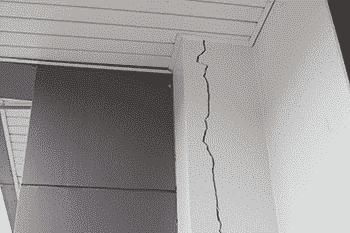What the Cracks in Your Foundation Walls Mean
Common Foundation Cracks

Whether or not you have a basement, your home could be in danger of developing foundation or wall cracks. If your home is sinking or settling, you may find that cracks are beginning to form in the foundation. A sinking or settling foundation could cause cracks to form in the basement walls. Sometimes, voids form beneath your foundation, removing support from that part of the foundation and putting pressure on it. This causes the foundation to shift and crack. These voids often occur if the soil beneath the foundation was not properly compacted during construction of your home. They can also be formed by erosion or soil shrinkage in drought conditions. Soil expansion due to excess water can also cause cracks, as the more water the soil absorbs, the more the hydrostatic pressure builds up and puts stress on the foundation.
Normally, cracks in your slab foundations indicate a settling or sinking foundation. If this is the case, the best solution is to use foundation underpinning methods to raise the foundation back to its original position. The most common types of underpinning are done with steel push piers or helical piers. Both types of piers work in much the same way; they are driven into stable soil deep in the ground and the weight of the structure is transferred onto them. The main difference between these two types of piers is that while steel push piers are merely driven into the ground, helical piers are screwed in to provide a bit of extra stability. Other methods to fix slab cracks could be to fill the voids beneath the foundation by pressure grouting. This will stabilize your foundation and prevent more cracks from forming. If these methods do not completely close the cracks in your foundation, they can be filled or sealed with an epoxy or polyurethane grout.
Basement Wall Crack Repair Options
Basement wall cracks can also be a symptom of foundation failure. There are many different types of wall cracks, and different types indicate different problems, usually bowing walls or settling foundations. Bowing walls are usually caused either by a settling foundation (especially if they are bowing outward) or by excess pressure from the soil around them. They can be fixed with the use of plate anchors or helical tiebacks, which provide lateral counter-pressure for bowing wall. If you find a wall crack in your basement walls, identify what type it is and contact a foundation repair contractor immediately to discuss repair options. The following list describes a variety of wall cracks and what they might mean.
 Vertical – Settlement or Heaving
Vertical – Settlement or Heaving- Horizontal – Bowing
- Angled – Settlement
- Angled and Horizontal – Bowing
- Horizontal and Vertical – Bowing or Settlement
- Converging in Center – Bowing or Settlement
- Stair Step (usually in block or brick walls) – Settlement or Heaving
- Wider at the Top – Side Settlement
- Wider at the Bottom – Center Settlement
Cracks in your foundation or basement walls are an indication of serious issues and should not be ignored. If you find a crack in your foundation, it could mean that your foundation is settling and needs to be repaired as soon as possible. Cracks in your basement walls most likely mean that you are suffering from either a sinking foundation or bowing walls. My Foundation Repairs can help connect you to a professional foundation repair contractor in your area.
